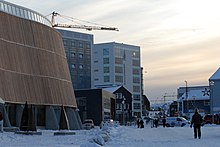Self-governance
| Part ofa serieson |
| Governance |
|---|

Self-governance,self-government,self-sovereignty,orself-ruleis the ability of a person or group to exercise all necessary functions ofregulationwithout intervention from an externalauthority.[2][3][4]It may refer to personal conduct or to any form ofinstitution,such asfamily units,social groups,affinity groups,legal bodies,industry bodies,religions,andpolitical entitiesof various degrees.[4][5][6]Self-governance is closely related to various philosophical andsocio-politicalconcepts such asautonomy,independence,self-control,self-discipline,andsovereignty.[7]
In the context ofnation states,self-governance is callednational sovereigntywhich is an important concept ininternational law.In the context ofadministrative division,a self-governingterritoryis called anautonomous region.[8]Self-governance is also associated with political contexts in which apopulationordemographicbecomes independent fromcolonial rule,absolute government,absolute monarchy,or any government that they perceive does not adequatelyrepresentthem.[9]It is therefore a fundamental tenet of manydemocracies,republicsandnationalistgovernments.[10]Mohandas Gandhi's term "swaraj"is a branch of this self-rule ideology.Henry David Thoreauwas a major proponent of self-rule in lieu of immoral governments.
Background
[edit]This sectionneeds expansion.You can help byadding to it.(November 2020) |
This principle has been explored in philosophy for centuries, with figures inancient Greek philosophysuch asPlatopositing thatself-masteryis necessary for true freedom. Plato believed that individuals or groups cannot achieve freedom unless they govern their own pleasures and desires, and instead will be in a state of enslavement.[11][12]He states that self-mastery is the ability to be one's own master, it means being able to control one's own impulses and desires, rather than being controlled by them. Accordingly, this principle is not only a fundamental moral freedom but also as a necessary condition ofpolitical freedomand by extension the freedom and autonomy of anypolitical structure.[11]
John Lockefurther developed this idea, arguing that genuine freedom requires cognitive self-discipline and self-government. He believed that man's capacity for self-governance is the source of all freedom. He believed that freedom is not a possession but an action, that is, it is not something that you have but something you do.[13]Locke proposes thatrationalityis the key to trueagencyand autonomy, and that political governance is enabled by the governing of one's ownjudgement.[14]His political philosophy was a prominent influence onImmanuel Kant,and was later taken up in part by theFounding Fathers of the United States.
The nature of self-governance, that freedom relies upon self-regulation, has further been explored by contemporary academicsGilles Deleuze,Michel Foucault,Judith Butler,William E. Connolly,and others.[15]
Self-governance is not just a philosophical concept but also a practical one. It can be seen in various forms such as self-regulation, self-control, self-management and self-leadership. It is an important concept in the fields of management, leadership, and governance, and is seen as a key to achieving personal and organizational goals. Self-governance can also be seen in the context of community and society, where it refers to the ability of individuals to take responsibility for their own actions and the actions of their community.
Additionally, self-governance is also closely related to the concept of self-determination. Self-determination refers to the idea that individuals and groups have the right to govern themselves, to make decisions about their own lives and to determine their own future and political status without outside interference.[16]This concept is closely linked to the idea of self-governance because it emphasizes the importance of individuals and groups being able to take control of their own lives and to make decisions about their own future. It is also closely linked to the idea of autonomy, which refers to the ability of individuals and groups to make decisions for themselves, without external influence or control.
Means of self-governance
[edit]The means of self-governance usually comprises some or all of the following:
- Acode of conductthat outlines acceptable behavior within the unit or group.[17]This may include alegalorethical code(e.g. theHippocratic Oathofdoctors,or established codes ofprofessional ethics).
- A means of ensuring external authority does not become involved unless and until certain criteria are satisfied.
- A means of facilitating the intended functions of the unit or group.
- A means of registering and resolvinggrievances(e.g.medical malpractice,union procedures, and for achieving closure regarding them).[citation needed]
- A means ofdisciplinary procedurewithin the unit or group,[18]ranging fromfinesandcensureup to and including penalty of death.
- A means of suppressing parties, factions, tendencies, or other sub-groups that seek tosecedefrom the unit or group.
See also
[edit]References
[edit]- ^Greenland in Figures 2012.
- ^Rasmussen 2011,pp. x–xi.
- ^Sørensen & Triantafillou 2009,pp. 1–3.
- ^abEsmark & Triantafillou 2009,pp. 29–30.
- ^Sørensen & Triantafillou 2009,p. 2.
- ^Sørensen & Torfing 2009,p. 43.
- ^Rasmussen 2011,p. x.
- ^Ghai & Woodman 2013,pp. 3–6.
- ^Berlin 1997,pp. 228–229.
- ^Rasmussen 2011.
- ^abYoung 2018.
- ^Laks 2007.
- ^Casson 2011,pp. 159–160.
- ^Casson 2011,pp. 160–161, 167.
- ^Rasmussen 2011,p. xiii.
- ^"Legal Aspects of Self-Determination".The Princeton Encyclopedia of Self-Determination.Archivedfrom the original on 2023-11-28.Retrieved2023-12-26.
- ^Esmark & Triantafillou 2009,p. 31.
- ^Esmark & Triantafillou 2009,p. 32.
Works cited
[edit]- "Greenland in Figures 2012"(PDF).Greenland in Figures.stat.gl.ISBN978-87-986787-6-2.ISSN1602-5709.Archived(PDF)from the original on 13 November 2012.Retrieved10 February2013.
- Sørensen, Eva; Triantafillou, Peter (2009). "The Politics of Self-Governance: An Introduction".The Politics of Self-Governance.Ashgate Publishing.ISBN978-0-7546-7164-0.
- Esmark, Anders; Triantafillou, Peter (2009). "A Macro Level Perspective on Governance of the Self and Others".The Politics of Self-Governance.Ashgate Publishing.ISBN978-0-7546-7164-0.
- Sørensen, Eva; Torfing, Jacob (2009). "The Politics of Self-Governance in Meso Level Theories".The Politics of Self-Governance.Ashgate Publishing.ISBN978-0-7546-7164-0.
- Ghai, Yash; Woodman, Sophia (2013).Practicing Self-Government: A Comparative Study of Autonomous Regions.Cambridge University Press.ISBN978-1-107-01858-7.
- Young, Carl (2018). "Plato's Concept of Liberty in the Laws".History of Political Thought.39(3). Imprint Academic.ISSN0143-781X.
- Laks, André (2007)."Freedom Liberty and Liberality in Plato's Laws".Social Philosophy and Policy.24(2): 130–152.doi:10.1017/S0265052507070197.S2CID144268937.Archivedfrom the original on 2022-04-22.Retrieved2020-01-01.
- Berlin, Isaiah (1997). Hardy, Henry; Hausheer, Rodger (eds.).The Proper Study of Mankind.Chatto & Windus.ISBN978-0374527174.
- Casson, Douglas John (2011). "Freedom, Happiness, and the Reasonable Self".Liberating Judgment: Fanatics, Skeptics, and John Locke's Politics of Probability.Princeton University Press.ISBN978-0691144740.
- Rasmussen, Claire Elaine (2011).The Autonomous Animal: Self-governance and the Modern Subject.University of Minnesota Press.ISBN978-0816669561.
Further reading
[edit]- Bird, Colin (2000)."The Possibility of Self-Government".The American Political Science Review.94(3). American Political Science Association: 563–577.doi:10.2307/2585831.JSTOR2585831.S2CID147278871.Archivedfrom the original on 2022-05-04.Retrieved2019-12-30.
- Weller; Wolff, Stefan (2005).Autonomy, Self-governance and Conflict Resolution: Innovative approaches to institutional design in divided societies.Routledge.ISBN0-415-33986-3.
External links
[edit] Media related toSelf-governanceat Wikimedia Commons
Media related toSelf-governanceat Wikimedia Commons
